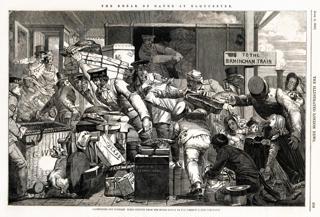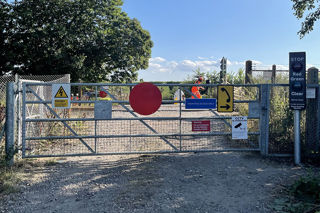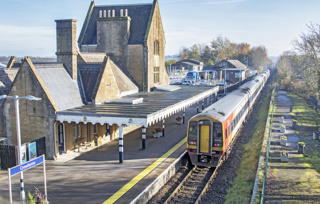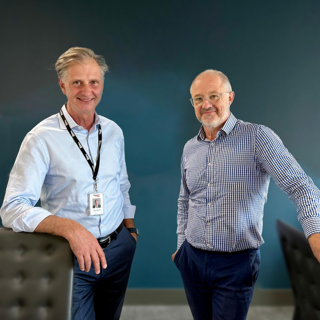I have often despaired at the poor-quality journalism seen in national broadcast and print news media. Sometimes, it’s actually funny. But the towering tsunami of misleading, badly researched and plain wrong ‘news’ I saw about the recent HS2 leaked report was anything but funny. It came closer to boiling my bladder than any other recent irritant. I cannot recall seeing such poor standards in the reporting of any railway news in the last decade. And my goodness, that’s a low bar.
I arrived home on January 20 after a day’s dire coverage of the leaked Oakervee HS2 report and switched on the TV. The first words I heard (direct quote) were from Sky News anchor Mark Austin: “…the HS2 train arriving in 20 years has a £106bn bill attached… details of a damning leaked report…”
BBC News also reported the £106bn figure as fact. For ITV, it was “the latest estimate”.
Bizarrely - but equally damaging - was a suggestion that north of Birmingham HS2 would use bits of new line cobbled together with sections of existing routes, conjuring images of pre-HS1 Eurostar from Waterloo. Unsurprisingly - and rightly - Greater Manchester Mayor Andy Burnham exploded, angrily rejecting this “second class option of trains trundling on old track north of Birmingham”.
I have many issues with Burnham’s rail approach (especially Northern), but on HS2 RAIL is shoulder-to-shoulder with the Manchester Mayor and Birmingham Mayor Andy Street. This pair are batting jointly across the political divide to campaign for HS2 - and I’m right there with them.
This is an enormously important and highly divisive national question demanding rational argument - but this is well-nigh impossible when the story as reported by wider national media is so flawed and deficient.
When I started in railway journalism as Assistant Editor of Steam World in 1981, I vividly remember Editor David Wilcock saying: “Nige, we aren’t here to give either a platform or credibility to nutters!” There were only a handful of standard gauge heritage railways back then, and Woodham’s Barry scrapyard was still full of derelict steam engines. Every day brought press releases making wild claims about buying and reopening another branch line, or selling enough key rings to acquire and restore Woodham’s wrecks ‘within two years.’
David was right that an editor has a responsibility to excercise a healthy degree of informed scepticism. His view was that if we reported every scheme as they would have liked, we would have looked silly and misled our readers into believing some wild claims. He insisted on at least challenging those claims, setting context and examining provenance in reporting their news.
This sort of scepticism seemed completely absent from all the HS2 Oakervee leak news coverage I saw or read. Every news editor had apparently swallowed it whole, failed to properly understand its nuances, and served up the damaging coverage its leakers had hoped for. Gullible news editors had ‘fallen for it’.
■ Where was the scepticism? The key questions for a news editor were: Who leaked this? What do they have to gain? What is it the leakers want us to say to further their case? Can the figures be trusted? Where do the numbers come from? What do they cover? Are we being used by the leaker for his or her own ends?
So, I’ve listed a few of the myths (which should have been dispelled), key questions (that should have been answered), and contextual points (which should have been clarified) about the leaked report. As a news editor of 35 years and counting, here are some notes I would have made, to brief my journalists:
■ North of Birmingham, all we have are lines drawn on a map. No detailed design has been done. None. So how is that £106bn arrived at? And what is it? Estimate? Proposed budget? Make sure we have properly taken inflation into account and don’t forget the very large Treasury contingencies forced on HS2 a few years ago, which jacked up costs from £32bn to around £44bn. Is Oakervee saying that costs could reach £106bn unless HS2 north of Birmingham is reassessed/redesigned?
■ Using traditional lines and some new HS lines north of Birmingham? Does that really mean a Eurostar-Folkestone ‘trundle’? Or is Oakervee proposing that HS2 north of Birmingham should be designed in conjunction with Northern Powerhouse Rail, so existing and high-speed services are properly integrated? Dig deeper into this to ensure we properly understand what is really being said.
■ New northern Conservative MPs claim that Northern Powerhouse Rail (NPR) is more important than HS2 and should be pursued instead. Ask them to explain precisely what they mean, given that NPR is 100% dependent on using HS2 infrastructure, such as the enlarged/enhanced Manchester Piccadilly. If HS2 isn’t built, then NPR as envisaged is impossible. How do these Tory MPs reconcile their opposition to HS2 with the Prime Minister’s promises to ‘do right’ by northern constituencies who lent them their votes (his words) in 2019? Put them on the spot.
■ Related question - nail this nonsense that HS2’s budget could be better spent on northern city transport projects, or even hospitals and schools. Projects such as HS2 are funded from specific borrowing, because long-term financial benefits ensure the project pays for itself through increased economic activity. If HS2 is scrapped that borrowing doesn’t take place. There is no pile of HS2 money which could be spent on Northern light rail or hospitals - or anything else. This is a myth.
■ As for HS2 being the most expensive railway in the world (or the most expensive in Europe), Crossrail and the Channel Tunnel were both more expensive. As for comparative European HSR costs; if you exclude stations and rolling stock from the price, HS2 Phase 1 has a rough cost of £24bn - about £170m per mile at 2019 prices. That compares with £109m/mile for HSL-Zuid in the Netherlands and £200m/mile for the Gyeongbu high-speed railway in South Korea - both lines where the stations were a separate project. Incidentally, HS1 cost £135m/mile at 2019 prices, while the M74 extension in Glasgow cost £185m/mile. Crossrail is costing at least £270m/mile.
Aside from the direct financial costs of cancelling HS2 (up to £8bn has already been spent) and tens of thousands of obvious job losses, what would be the long-term wider financial implications for UK plc? It would be unprecedented for such a massive project, which has been under way for a decade, to be cancelled. How would our civil engineering and construction industry react? Would contractors lose trust in Government? Would they ‘price in’ much higher risk on future government projects? Will future big projects therefore cost more if we scrap HS2? Is this a greater cost than whatever the perceived savings are from scrapping HS2?
■ Let’s clarify the ancient woodlands question. The emerging new Lower Thames motorway crossing (14 miles) takes 54 hectares of such woodland, while the entire 345 miles of HS2 takes just 58 hectares. A House of Lords committee has commented: “The loss of less than one hectare of ancient woodland from about 11,000 in the Chiltern AoNB is, we consider, a remarkable achievement.” Let’s answer this definitively. It is claimed that the whole HS2 route from London to Leeds and Manchester will have an impact on just 0.01% of our ancient woodlands - that’s just one ten-thousandth of ALL the UK’s ancient woodland. Opponents give the impression of much greater impact. Find out.
■ One of the biggest cost drivers has been Government’s insistence that HS2 contractors take long-term risk on whatever they build. This has added around 30% to costs on Phase 1 - on the whole project this would amount to £30bn of avoidable costs to the taxpayer.
I’ll leave you to decide how many of these key issues were properly explored by TV and print news in their Oakervee leak coverage. That potential £30bn of extra costs caused directly by Government procurement policy has not been reported or commented on in detail anywhere in the national news. Shameful. News editors should hang their heads in shame. How could such a major source of over budget cost be missed?
A major problem is that just about all the news coverage I saw focused almost exclusively on financial cost. The costs of NOT going ahead with HS2 barely had a mention in terms of the lost massive capacity enhancements on the West Coast, East Coast and Midland Main Lines, all of which would benefit from a doubling - or even tripling - of capacity at not one penny of extra cost in terms of better infrastructure. All HS2 benefits to the existing network come from the removal of existing trains. On the West Coast, for example, transferring 47 daily Euston-Manchester weekday expresses alone to HS2 releases enormous capability to run many more commuter, inter-urban and freight trains. And by the way, the fact that this number before privatisation was 17 underscores the urgent need for HS2. As Yorkshire journalist Andrew White pointed out, the National Audit Office’s 2006 report into the West Coast Route Modernisation concluded: “The programme’s remaining key projects will increase capacity for passengers and freight, but the industry consensus is that the line will not be able to sustain current growth levels beyond 2015-2020.”
HS2 effectively gives us four ‘new’ main lines for the price of one - nowhere do you see this enormous ‘free’ benefit strongly reported or advocated. The quickest way to get thousands of new commuter trains onto our existing network is to build HS2.
A common anti-HS2 argument is that
existing lines could be upgraded instead of building HS2. Not one of these critics offers any evidence as to how it might be accomplished, or at what cost. To their shame, not a single national media news editor… not one… briefed staff to examine such a frequently peddled alleged HS2 alternative.
We have done this. I asked a specialist to look at upgrading existing lines to broadly assess what this would actually mean. Let’s start with the first requirement: segregation of long-distance express services, which is one of HS2’s key advantages. We would need to:
■ Add two extra tracks on the WCML all the way from London to Birmingham andf Manchester.
■ Add two extra tracks for much of the MML as far as Sheffield.
■ Add two extra tracks on the ECML from King’s Cross to Leeds and York, including new tunnels and a new viaduct at Welwyn.
■ Quadruple CrossCountry’s routefrom Birmingham to Derby, Sheffield and Doncaster.
■ Grade separate EVERY junction on ALL of those lines - dozens of projects the size of the current £200m Werrington dive under, north of Peterborough.
Anyone recalling the heartache, massive cost, disruption and significant political damage caused by the West Coast upgrade to the government of the day will recoil at such a prospect. Small wonder NR CEO Andrew Haines described this supposed alternative to HS2 as “absurd”, warning that it could close parts of our inter-city network every weekend for 30 years. Think also of imposing London Bridge or Euston-style disruption nationwide at every major station, where extending platforms for longer trains and widening the footprint for extra platforms would wipe out thousands of homes and businesses as well as triggering massive road diversion costs in all these congested towns and cities. In the countryside, those thousands of miles of main line widening would have a much bigger impact on ancient woodland than the 0.01% that HS2 planners have been smart enough to secure.
Watch or listen to national broadcast news, or read the newspapers, however, and you’ll learn none of this crucial information.
Oh, and by the way - even after such massive disruption over three decades, upgrading the existing network would still only create a fraction of the massive capacity uplift which HS2 brings on the three existing main lines from London to the North. Building HS2 really is a no-brainer when you know the facts, but the failure of national news to tell you all this means we are courting national, economic, social and transport disaster.
The consensus is that the Oakervee leak came from Downing Street advisers who are keen to kill HS2. And unless supporters rally and push back - hard - they may yet succeed.
They are shamefully aided and abetted by Secretary of State for Transport Grant Shapps, who, I assume, is dragging his feet because he is terrified of losing his job in the forthcoming Cabinet reshuffle. His often ludicrous comments about railways (“train operators have no incentive to run to time”) indicate a woeful lack of understanding to accompany his very evident lack of detailed interest in rail.
Nature - and politics - abhors a vacuum. In the absence of Oakervee’s published conclusions, we first had Lord Berkeley’s feeble minority report, which frankly even the national media found weak and pointless. Now we have this much more dangerous and malicious leak, seemingly from No. 10 advisers, which is doing real damage to HS2 given the appalling failings I have outlined in national news reporting and analysis. Shapps must understand that history will damn him for his clear breach of the Government’s promise to publish Oakervee promptly, when he received it - which was before Christmas.
Shapps and DfT officials parrot the line that Oakervee’s report is incomplete. That is not true. In my detailed research for this Comment Special I came across a tweet posted on January 20 by Andrew Sentance, whose header tells me that he is “Senior Adviser to Cambridge Econometrics and independent business economist, member of Bank of England MPC, 2006-11”:
“It is a total shambles that this HS2 review has not yet been published. It was completed nearly three months ago. I know as I was a member of the Oakervee review panel. When ministers describe the review report as a ‘draft’ they are misleading the public.”
In other words - we are being lied to. What a disgusting state of affairs, presided over by a Prime Minister who promised a new and honest approach. We are not seeing that.
My final words here are to Prime Minister Boris Johnson and HS2 Review Chairman Doug Oakervee - who I suspect is beyond enraged at this appalling Government policy, which is to allow this malicious leak to do its worst. This ‘rolls the pitch’ for scrapping HS2, or scaling it back to the point it becomes pointless, but still costs a fortune. It’s dishonest.
Doug - if you want to sit down for an interview with me, now or in future, just call me.
Boris - if you want to keep your credibility - but more importantly (for you and your legacy) those millions of loaned Northern votes which gave you the keys to No. 10 and such an enormous majority - do the decent and right thing: keep your promises.
Stand by your word. Convince us you told the truth. Let’s get HS2 done.

















Johnny walker - 14/02/2020 16:50
let work on Upgrading existing lines and scrap hs2 and you should be ashamed of yourself Boris Johnson make hs2 to go ahead it should not go ahead and let give hs2 red light and scrap hs2 now and let work on reopening existing old rail tracks .